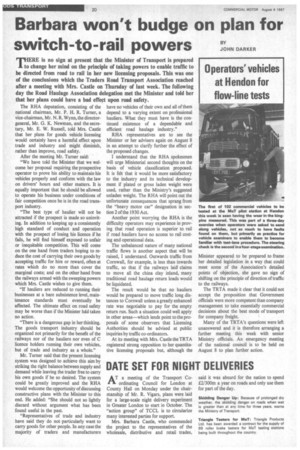Barbara won't budge on plan for switch-to-rail powers
Page 22

If you've noticed an error in this article please click here to report it so we can fix it.
RE is no sign at present that the Minister of Transport is prepared THERE
her mind on the principle of taking powers to enable traffic to be directed from road to rail in her new licensing proposals. This was one of the conclusions which the Traders Road Transport Association reached after a meeting with Mrs. Castle on Thursday of last week. The following day the Road Haulage Association delegation met the Minister and told her that her plans could have a bad effect upon road safety.
The RHA deputation, consisting of the national chairman, Mr. P. H. R. Turner, a vice-chairman, Mr. N. R. Wynn, the directorgeneral, Mr. G. K. Newman, and the secretary, Mr. E. W. Russell, told Mrs. Castle that her plans for goods vehicle licensing would certainly have a harmful effect upon trade and industry and might diminish, rather than improve, road safety.
After the meeting Mr. Turner said: "We have told the Minister that we welcome her proposal requiring the prospective operator to prove his ability to maintain his vehicles properly and conform with the law on drivers' hours and other matters. It is equally important that he should be allowed to operate his business under conditions of fair competition once he is in the road transport industry.
"The best type of haulier will not be attracted if the prospect is made so uninviting. In addition to keeping up a consistently high standard of conduct and operation with the prospect of losing his licence if he fails, he will find himself exposed to unfair or inequitable competition. This will come on the one hand from traders hoping to reduce the cost of carrying their own goods by accepting traffic for hire or reward, often at rates which do no more than cover the marginal costs; and on the other hand from the railways armed with the sweeping powers which Mrs. Castle wishes to give them.
"If hauliers are reduced to running their businesses at a bare subsistence level, maintenance standards must eventually be affected. The ultimate effect on road safety may be worse than if the Minister had taken no action.
"There is a dangerous gap in her thinking. The goods transport industry should be organized not primarily for the benefit of the railways nor of the hauliers nor even of C licence holders running their own vehicles, but of trade and industry as a whole."
Mr. Turner said that the present licensing system was designed to achieve this aim by striking the right balance between supply and demand while leaving the trader free to carry his own goods if he so desired. The system could be greatly improved and the RHA would welcome the opportunity of discussing constructive plans with the Minister to this end. He added: "She should not so lightly discard without argument what has been found useful in the past.
"Representatives of trade and industry have said they do not particularly want to carry goods for other people. In any case the majority of traders and manufacturers have no vehicles of their own and all of them depend to a varying extent on professional hauliers. What they must have is the continued existence of a dependable and efficient road haulage industry."
RHA representatives are to see the Minister or her advisers again on August 8 in an attempt to clarify further the effect of the proposed changes.
I understand that the RHA spokesmen will urge Ministerial second thoughts on the basis of vehicle classification proposed. It is felt that it would be more satisfactory to the industry and its technical development if plated or gross laden weight were used, rather than the Ministry's suggested unladen weight. The RHA will point out the unfortunate consequences that sprang from the "heavy motor car" designation in section 2 of the 1930 Act.
Another point worrying the RHA is the difficulty operators may experience in proving that road operation is superior to rail if road hauliers have no access to rail costing and operational data.
The unbalanced nature of many national traffic flows is another aspect that will be raised, I understand. Outwards traffic from Cornwall, for example, is less than inwards traffic, so that if the railways laid claims to move all the china clay inland, many traditional road haulage return loads would be liquidated.
The result would be that no hauliers would be prepared to move traffic long distances to Cornwall unless a greatly enhanced rate was negotiable to pay for the empty return run. Such a situation could well apply in other areas—which lends point to the proposals of some observers that Licensing Authorities should be advised at public inquiries by traffic co-ordinators.
At its meeting with Mrs. Castle the TATA registered strong opposition to her quantitative licensing proposals but, although the Minister appeared to be prepared to frame her detailed legislation in a way that could meet some of the Association's detailed points of objection, she gave no sign of shifting on the principle of direction of traffic to the railways.
The TRTA made it clear that it could not accept the proposition that Government officials were more competent than company management to take essentially commercial decisions about the best mode of transport for company freight.
Many of the TRTA's questions were left unanswered and it is therefore arranging a further meeting this week with senior Ministry officials. An emergency meeting of the national council is to be held on August 8 to plan further action.












































































































